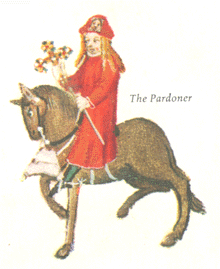|
¡@
The
Pardoner's Prologue and Tale
 |
The
PARDONER'S PROLOGUE |
The
prologue starts out with a confession--because he is with
strangers and will not see them again The Pardoner is also an exhibitionist
(in words): a clever hypocrite exploits Christian principles in
order to rich himself.
"The love of money is the root of all
evil"--the center of his preach/tale--used most effectively
in order to frighten his hearers
into a generosity that will fulfill his own rapacity
(cupidity)/greed.
Exempla (exemplum): stories that
illustrate concretely the sermon's point; give example to
illustrate
Consistency is in the general
prologue and in the introduction to the pardoner and the tale.
¡@
|
 |
 |
THE
PARDONER'S TALE |
- The tale is about the
destructiveness of avarice.
- Time: the bubonic plague;
Black Death
- Lechery, drunkenness, greed,
gluttony (drunk, eating), gambling, perjury--there are also what the
pardoner is doing--He is laughing at his own weakness for he is
doing the same thing himself.
- The climax of
the story moves very fast (only a few lines): The story of the young
men who seek Death only to find him in a treasure that had made them
forget him is a masterpiece of irony.
- The pardoner's candid
confession has concealed the fact that he is a eunuch, but his
secret is revealed in the epilogue by
the Host's coarse response when the Pardoner tries to collect money
from the pilgrims--His verbal facility
by which he maintains his superiority fails him.
- Ironical: 1.
The pardoner is very good at speaking, but in the end of the story
he is too angry to speak, to refute the Host. 2. After
his tale, he tries to trick them yet fails.
- Why does he trick them
since he should know they are intelligent?
1. So highly developed is his sense of
irony that it enables him to feel superior to other people.
2. He has been drinking too much.
3. It's a habit to get payment.
4. He over-estimates his cleverness;
over-confident and under-estimates the Host.
5. As exhibitionist, once he starts, he
can't stop; He is going to do it again.
- The epilogue: the Host's
revenge--point out the pardoner's physical weakness: not a complete
man, a eunuch!
- It is interesting to see the
interaction among the pilgrims.
Study Questions on
Chaucer II
On "Pardoner's Prologue and Tale"
19. What are the three
biblical examples that the Pardoner uses to illustrate "The luxur
is in Win and dronkenesse" (l.196)?
20. What do you think of the Pardoner's tale?
Is the tale consistent to the story teller's character?
¡@
¡@ |